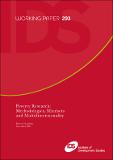| dc.description.abstract | After defining key words and listing biases and limitations, this paper seeks to
explore linkages between methodologies, mindsets, concepts and perceptions in
research on poverty. Risking caricature, three streams, syndromes or paradigms are
described: first, reductionist - standardised, non-contextual and quantitative,
associated with questionnaire surveys, income-poverty, poverty lines and economic
analysis; second, particularistic – idiosyncratic, qualitative and contextual, associated
with participant observation, ideas about poverty in cultures and communities and
anthropological analysis; and third, participatory – pluralist, interactive and
multidimensional, associated with facilitation of poor people’s own analysis, and
pioneered by a growing number of innovators.
Three approaches to the multidimensionality of poverty have been multidisciplinary
teams, composite indicators, and mixed methods. Complementing these,
participatory methodologies go further into new ground. In the past decade and a
half they have exploded with creative diversity, not least with participatory poverty
assessments, methodological innovations for research, face-to-face experiential
learning, and local people’s own research.
The contrasting mindsets of economics, anthropology and participatory pluralism
are reflected in and reinforced by their different forms of representation. The
multidimensional nature and linkages of poverty and illbeing can be represented by
nets and webs.
Participatory methodologies repeatedly surprise, and reveal and illuminate relatively
neglected dimensions of poverty and illbeing like seasonality, the places of the poor,
the importance of the body, and how these and others interlock. With participatory
pluralism, methods can be invented and evolved to fit specific topics. Lessons learnt
include the need for enough time for trials and piloting; the critical importance of
selection, training and mentoring of facilitators; and how behaviour, attitudes,
ethics and quality are linked.
Participatory pluralism is part of a quiet methodological revolution that has passed
largely unnoticed in disciplinary mainstreams. It is blocked by embedded professional mindsets and habits, and by personal, bureaucratic and institutional resistance and
inertia, not least in universities. The questions are whether the future of
methodology in poverty research lies now much more with this eclectic, creative
and participatory pluralism, and whether this can offer a win-win, a best of all
worlds, for all, professionals and people living in poverty alike. | en_GB |

